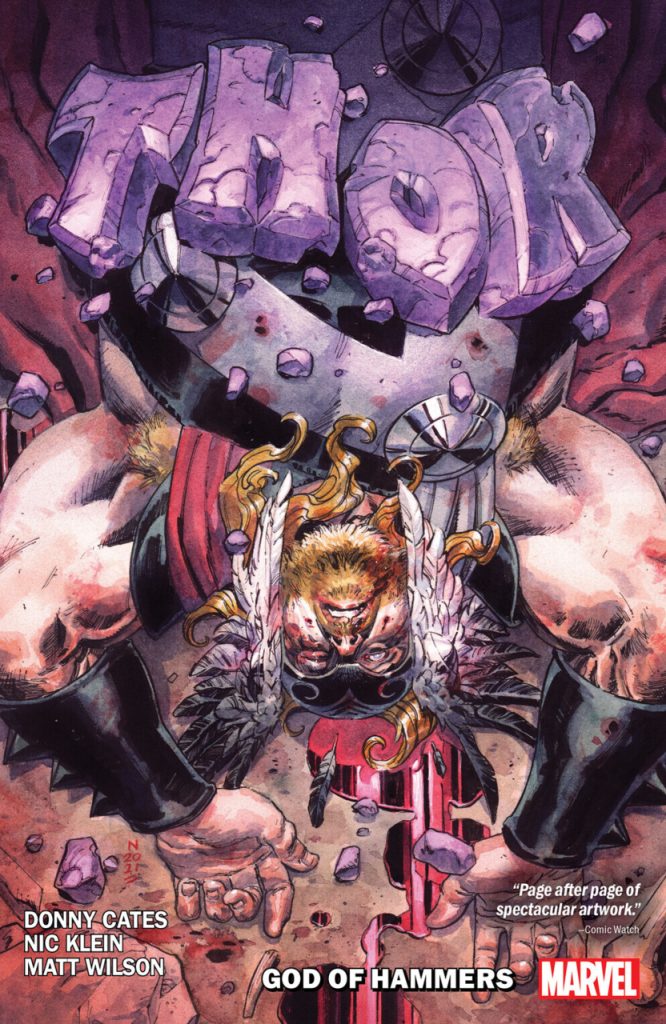Review by Frank Plowright
Since becoming king of Asgard, Thor has found it increasingly difficult to hold his hammer, Mjolnir. He concluded the difficulties were due to it being a warrior’s weapon, and not suitable for a king, so stored it with Avengers, from where, as seen in Revelations, it’s been stolen. If this weren’t serious enough, he’s seen a vision of the future in which Thanos confronts him holding Mjolnir. Whoever’s taken it is further able to avoid all methods of tracking, and God of Hammers’ opening chapter shows the horrific solutions the thief applies to avoid detection.
The opening sequence from a book of Asgardian prophesies is spectacularly drawn by Nic Klein. To be fair, so is the remainder, but this resonates for Donny Cates diving to the core of Asgardian legend enabling Klein to bring his own version of Jack Kirby. Pretty much the entire volume is about power on an unimaginable scale, and Klein delivers it astonishingly well.
As there’s a god for most things, it may be no surprise that the volume title is to be taken literally, despite Odin dismissing it as a myth. Then again, much of what Odin’s done has proved fallible of late, so perhaps he’s not the best judge, and Asgard has traditionally been driven by prophecy. This one is particularly nasty, involving uniting the other realms against Asgard. If this sounds like Cates is rehashing The War of the Realms, he has Odin comment as such in-story, and immediately swerves away from any comparison, not least by a creative reintroduction of an old villain.
While it might make for a very good standalone story, Cates is too fond of reshaping certainties for it to be satisfying as another chapter of Thor. His explanation of Mjolnir now having sentience after decades of silent service isn’t convincing, and even less so considering the taunting personality developed. More appreciated is the storytelling sophistication. As seen on earlier volumes, Cates loves bringing matters to boiling point, then starting the concluding chapter with another matter, teasing before satisfying.
However, it’s not entirely satisfying because the curtain doesn’t have to be pulled too far back to reveal the prophecy setting everything in motion never came to pass in any respect, so it’s just sensationalism. God of Hammers didn’t need it, either, as the main plot could have been introduced in so many ways that would have made sense. The spectacle is great, but the plotting is idle. It also raises a bigger question for Cates’ entire run. If this supposedly infallible prophecy proved utter rubbish, why would Thor still remain in thrall to a prophecy from a less trusted source?
Because the final chapter coincided with Thor’s 750th issue, assorted creators who’ve worked on Thor before contribute short stories. Walter Simonson’s look at Beta Ray Bill’s past is stunningly illustrated, while Dan Jurgens makes the strange decision to draw in the styles of others in preference to his own polished art. Olivier Coipel doesn’t have much opportunity for action in J. Michael Straczynski’s tale of Thor dictating his will, while Al Ewing and Lee Garbett set up Defenders Beyond, and Jason Aaron and Das Pastoras consider Mjolnir.
Cates ends on a cliffhanger with The Legacy of Thanos next. If you can ignore Cates’ methods, there’s a lot to enjoy, but for many readers he’ll be too slapdash.







